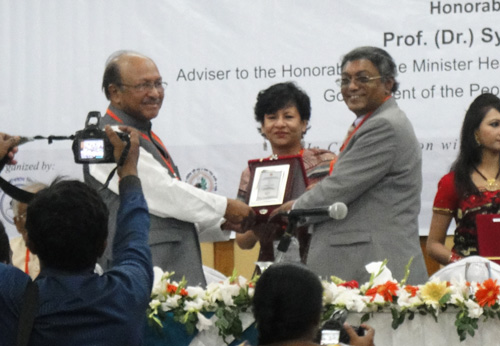
29 May 2012, Dhaka. During 28-30 April 2012, BRAC community component of IYCF attended the South Asian Regional Conference on Breastfeeding and Complementary Feeding at Bangabandhu International Conference Center (BICC), Sher-e-Bangla Nagar, Dhaka, Bangladesh. The South Asian Regional Conference on Breastfeeding and Complementary Feeding awarded a crest to BRAC on April 28 2012 in recognition of its excellent services for the Infant and Young Child Feeding to the nation. Professor Dr Mudasser Ali, Advisor to the Honorable Prime Minister for Health and Family Welfare and Social Welfare Affairs presented the crest at the Ruposi Bangla Hotel. Dr Kaosar Afsana, Director Health, received the crest on behalf of BRAC.
Alive & Thrive (A&T) is a learning project to develop scaled up models for preventing child malnutrition through improving Infant and Young Child Feeding (IYCF) practices. BRAC’s community component of Alive &Thrive intervention focuses on achieving behavior change through counseling, coaching and demonstration and is being duly supported by social mobilisation activities to ensure an enabling environment in the community. A&T began its preparatory phase in the mid of 2009 in three sub-districts and one slum to test and refine the model. Accordingly, the project started its activities after the recruitment and deployment of the staff in 22 sub-districts by the end of June 2010, and 28 sub-districts by December 2010 respectively. The total number of working areas is now 50 rural sub-districts.IYCF Promoters/ Pushti Kormis (PK) are the new frontline workers who are devoted to the delivery of IYCF services through Alive & Thrive Initiative. The Pusti Kormis provide age-specific home visits, especially during the first year of life, and are on call to handle feeding problems that cannot be solved by the other frontline workers and to provide follow-up services.The project is conducting social mobilisation in all 50 upazilas as a process where the religious leaders, govt. health and family planning officers, village doctors, adolescents, parents and school teachers, local leaders and elderly people, all meet in equal terms to facilitate the IYCF. In other words, it can be viewed as a process which begins as a dialogue among the members of the community to determine who, what, and how the issues are decided, and also to provide an avenue for everyone to participate and support the decisions that affect the IYCF practices in the community.








